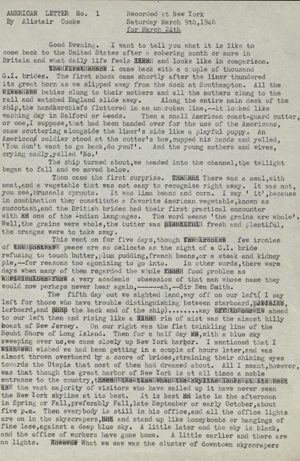Emmy-Winning Immigrant’s Take On America
BU helps launch new website with Alistair Cooke’s recordings, scripts

Alistair Cooke, preparing for a Letter from America broadcast, N.Y., ca. 1970. Alistair Cooke photographs, used with permission. © Cooke Americas, RLLP
Long before, and long after, baby boomers and Gen Xers met Alistair Cooke as host of Masterpiece Theatre, the urbane British broadcaster served an immigrant’s take on the United States to a global audience. His Letter from America, broadcast on BBC Radio 4 and its predecessor, was a weekly 15-minute audio card about life in this country—elections, movies, pop culture, social developments like civil rights—spanning 58 years, from the age of Franklin Roosevelt to that of George W. Bush. (In contrast, his Masterpiece gig ran a mere 21 years, until 1992.)
Now a pair of linked websites with 930 of those nearly 3,000 audio Letters, along with their manuscripts featuring Cooke’s edits and corrections, has been created by BU’s Howard Gotlieb Archival Research Center (HGARC), in collaboration with the BBC. The partnership was a natural: the center’s Alistair Cooke Collection houses notebooks, letters, photos, awards, and audio and film. The collection includes 2,500 of the manuscripts Cooke read for his Letter broadcasts. The new websites allow researchers to hear Cooke’s work on a BBC site while seeing it simultaneously on a BU site—precisely the goal of HGARC director Vita Paladino, who traveled to London to pitch the idea to BBC officials.
“Cooke’s work helped millions of British people understand why Americans vote the way they do, talk the way they do, and think the way they do,” says Paladino (MET’79, SSW’93). “The collection of his work is a rich resource for understanding American life, politics, and culture. It’s a moving experience to see someone from another country capture the essence of America and present it to the world.”

Cooke immigrated to the United States in 1937 as a commentator for the BBC and became a citizen in 1941. He began Letter from America five years later. During the broadcast’s almost six decades, many things changed, including the name (it was called American Letters for the first four years). During his Letter’s life, there were a dozen presidencies, a World War followed by a Cold War and later a Vietnam War and a War on Terror, the move for African American civil rights, women’s rights, and gay rights, and the rise of rock ’n’ roll, rap, and all music tastes in between.
The letter writer did not confine himself in his musings, but could weave together the light and the heavy. A holiday broadcast recorded on Christmas Eve 1999 roamed from a description of yuletide New York to First Amendment fights over public decorations (good Englishman that he was, Cooke also worked in the history of Dickens’ A Christmas Carol).
The BBC is busily digitizing another 620 of Cooke’s broadcasts for the website, while the Gotlieb Center continues to digitize manuscripts.
Cooke outlived the original broadcast duration of his Letter from America, but just barely. On the advice of his doctors, he ended the series in 2004, at age 95. He died less than a month later. The afterlife of his Letter continues, thanks to BU and the BBC.

Comments & Discussion
Boston University moderates comments to facilitate an informed, substantive, civil conversation. Abusive, profane, self-promotional, misleading, incoherent or off-topic comments will be rejected. Moderators are staffed during regular business hours (EST) and can only accept comments written in English. Statistics or facts must include a citation or a link to the citation.